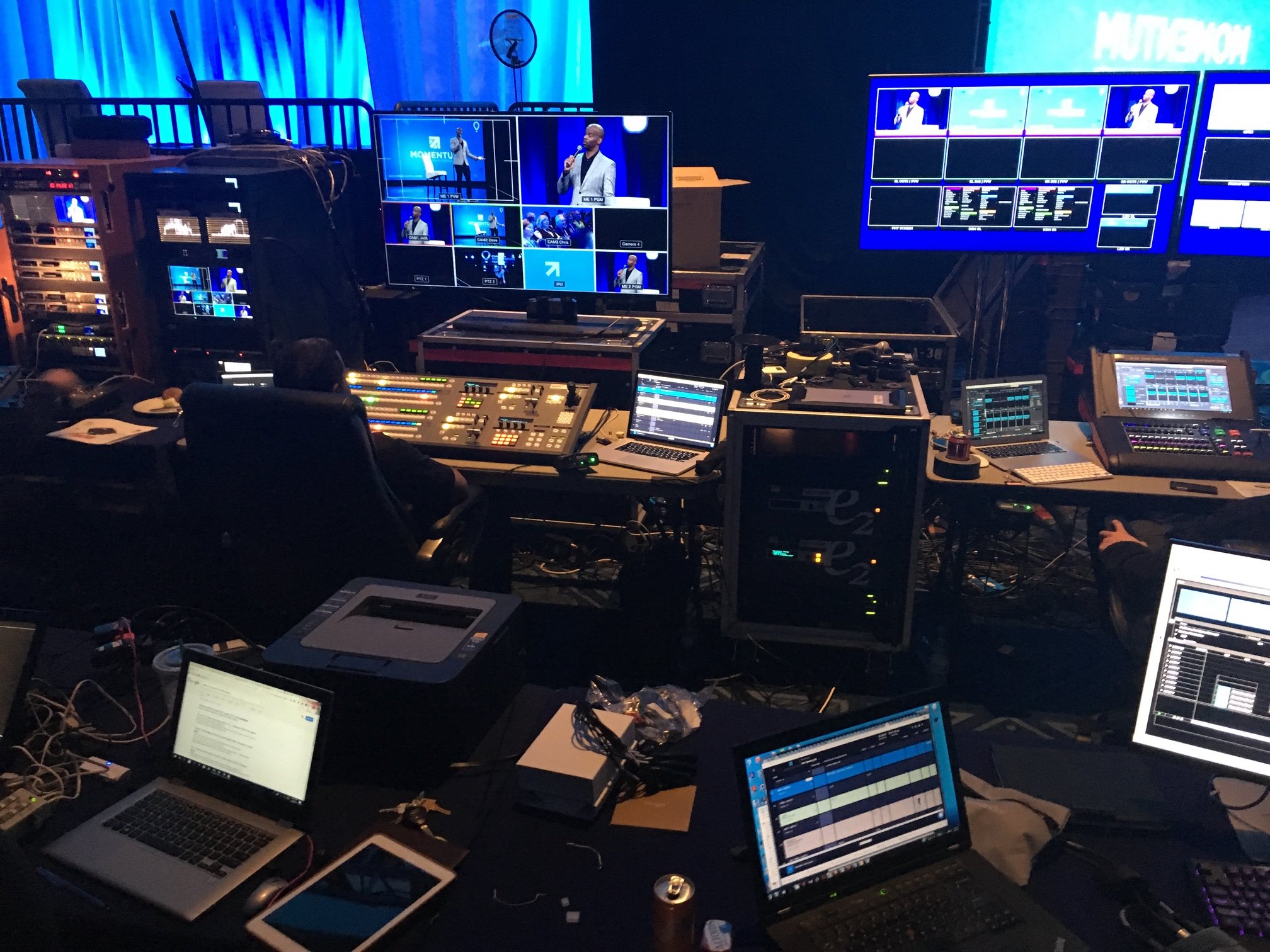Exactly How Event Production Functions: A Comprehensive Check Out the Process
Event production is a facility and structured procedure that calls for mindful planning and implementation. It begins with establishing clear goals and understanding the target audience. Each step, from budgeting to venue selection, plays an important function in ensuring success. As the procedure unravels, numerous aspects must align effortlessly. Yet, the nuances of this elaborate operation commonly go unnoticed. What are the key phases that add to an unforgettable event?

The First Drawing Board
When starting on event production, careful planning is vital to assure a successful end result. The first drawing board acts as the foundation for all subsequent initiatives. During this stage, event manufacturers should define the event's purpose and purposes plainly. Determining the target market helps customize the experience and messaging, ensuring relevance and engagement.Producers have to additionally take into consideration the event format, whether it be in-person, online, or crossbreed, as this will certainly affect numerous logistical components. Selecting an appropriate day and place is critical, as it impacts accessibility and availability.Furthermore, setting up a dependable group is essential for splitting duties and simplifying communication. Developing a timeline with landmarks warranties all tasks are completed on time. This phase includes thorough study, including determining potential obstacles and creating approaches to alleviate threats. Ultimately, a well-structured initial preparation phase sets the tone for an effective event production trip.

Budgeting and Resource Appropriation
In event production, effective budgeting and source allotment are vital for success - event production charlotte. Establishing monetary parameters sets the structure for all subsequent choices, while source distribution approaches assure that every element of the event is effectively sustained. Together, these components help maintain control over expenditures and maximize the use of available resources
Developing Financial Parameters
Establishing monetary criteria is important to the success of any kind of event production, as it sets the structure for efficient budgeting and resource allocation. This process starts with defining the general budget, which incorporates all facets of the event, consisting of venue expenses, catering, and advertising. By recognizing available funds, event organizers can focus on expenditures and designate sources accordingly. Additionally, it is important to perform complete marketing research to prepare for possible expenses and recognize financing sources, such as sponsorships or ticket sales. Developing clear economic parameters additionally aids in threat monitoring, permitting coordinators to reserve backup funds for unanticipated expenses. Inevitably, a distinct budget serves as a roadmap, assisting the event production group towards accomplishing their goals while keeping financial control.
Source Circulation Approaches
Reliable resource circulation approaches are crucial for making best use of the effect of an event while adhering to budget plan restraints. Successful event production requires a meticulous approach to budgeting and source allotment. Planners need to prioritize vital components such as place, event catering, and modern technology, ensuring that funds are designated to areas that improve participant experience. A comprehensive spending plan should detail expected expenditures and recognize locations for possible expense financial savings, such as bargaining with suppliers or exploring sponsorship possibilities. Additionally, tracking expenditures throughout the planning process assists stop overspending. By utilizing calculated source distribution, event producers can supply a memorable experience while maintaining financial duty, eventually adding to the total success of the event.
Place Option and Logistics
Choosing the ideal venue is necessary to the success of any kind of event, as it establishes the phase for the overall experience. Venue selection includes reviewing numerous aspects, including ability, accessibility, and location. Coordinators must take into consideration the target audience and the nature of the event, making sure the place lines up with the event's goals.Logistics play a considerable function in this process, including arrangements for seating, audiovisual equipment, and catering services. An appropriate location should help with smooth flow for guests and staff, improving engagement.Additionally, evaluating prospective venues for amenities like vehicle parking, toilets, and fire escape is vital for security and benefit. The timeline for safeguarding the place is additionally crucial, as preferred locations may book rapidly - event production charlotte. As a result, thorough planning and prompt execution can ultimately add to a seamless event experience, making venue choice and logistics fundamental components of successful event production
Imaginative Idea Development
While the place sets the physical phase, creative principle development forms the event's identification and narrative. This process starts with identifying the event's purpose and target audience, permitting event manufacturers to formulate a compelling motif that resonates with participants. Brainstorming sessions usually include diverse viewpoints, fostering ingenious ideas that line up with the event's goals.Once a motif is developed, aesthetic elements such as shade palettes, signage, and decoration are made to enhance the general ambience. Narration strategies might also be incorporated to produce an engaging trip for individuals, assuring a remarkable experience. In addition, factors to consider pertaining to amusement, activities, and interactive elements are straightened with the chosen idea, strengthening the theme throughout the event.Ultimately, efficient creative principle growth warranties that every aspect of the event works cohesively, leaving a long-term impression on guests and fulfilling the event's goals. This fundamental job lays the groundwork for subsequent preparation and execution phases.
Collaborating With Vendors and Vendors
Successful event production rests on reliable partnership with vendors and distributors. Choosing trustworthy partners, negotiating contracts successfully, and making sure prompt deliveries are crucial action in this procedure. Each of these variables contributes greatly to the overall success and smooth implementation of an occasion.
Picking Reliable Partners
Just how can event planners assure a seamless production experience? Picking dependable companions is essential in accomplishing this objective. Event organizers need to conduct complete study to recognize vendors and providers with a proven record of quality. This includes inspecting referrals, assessing profiles, and evaluating client feedback. Organizers ought click reference to prioritize companions who demonstrate professionalism, timely communication, and a desire to collaborate. Structure strong relationships fosters trust and allows fast analytical throughout the event. Additionally, it is valuable to select local vendors that comprehend the venue and local logistics. Inevitably, an effective event depends upon the harmony in between organizers and their companions, making sure that every element of production runs smoothly and efficiently.
Working Out Agreements Properly
Reliable arrangement of contracts is an important action in the partnership in between event coordinators and their vendors and distributors. This process why not try this out involves clear interaction of expectations, deliverables, and timelines. Coordinators must conduct extensive study on market prices and industry requirements to establish a baseline for arrangements. It is crucial to develop a collaborative environment, encouraging open dialogue about terms, rates, and prospective backups. Planners must likewise focus on comprehending the vendor's capacities and restrictions to straighten their requirements properly. Adaptability can cause equally valuable arrangements, cultivating long-lasting relationships. Crafting well-defined agreements that consist of certain efficiency metrics can help assure liability, inevitably bring about successful event execution and satisfaction for all events included.
Guaranteeing Prompt Shipments
Prompt distributions are important for the smooth execution of any kind of event, requiring persistent partnership in between planners and their vendors and suppliers. Efficient communication is vital, as it helps establish clear assumptions regarding shipment timetables, amounts, and details needs. Organizers commonly produce thorough timelines to describe crucial milestones, making sure all parties stay straightened throughout the process. Normal check-ins with suppliers can help determine possible delays early, permitting for positive remedies. In addition, developing strong connections with dependable vendors promotes trust and liability, which can lead to better solution and prioritization. By prioritizing these joint efforts, organizers can lessen disturbances, consequently enhancing the total effectiveness of event production and guaranteeing that all required products and solutions arrive as prepared.
Advertising and Promotion Strategies
While organizing an event, the success of advertising and promotion methods can substantially influence participation and interaction. Efficient methods often include a combination of electronic advertising, traditional advertising and marketing, and grassroots outreach. Utilizing social media systems permits real-time communication and targeted advertising, getting to details demographics efficiently. Email marketing campaigns can further involve potential attendees with personalized web content and reminders.Collaborations with influencers or market leaders can likewise enhance credibility and expand reach. Developing engaging web content, such as videos or blogs, aids to generate buzz and receive interest leading up to the event. Additionally, leveraging early-bird price cuts and special benefits can incentivize ticket purchases.Promoting with traditional channels, such as posters or neighborhood media, continues to be pertinent, specifically in community-focused occasions. A thorough method that integrates numerous approaches warranties maximum presence and engagement, inevitably adding to the go to the website event's success and the creation of a remarkable experience for guests.
On-Site Implementation and Management
On-site implementation and management are crucial elements that determine the general success of an occasion. Efficient sychronisation during the event guarantees that all elements align with the intended agenda. Event supervisors supervise logistics, consisting of vendor coordination, equipment setup, and guest solutions. Monitoring timelines and dealing with any kind of unforeseen issues are essential for preserving a smooth experience.The staff plays a substantial role, as experienced workers are in charge of various jobs such as registration, details dissemination, and technological assistance. Interaction amongst employee is crucial; it cultivates a collective environment and makes it possible for quick resolution of challenges.Additionally, safety and security procedures have to be followed, securing the wellness of all participants. Post-event assessments are likewise part of on-site administration, providing understandings for future improvements. By focusing on these facets, event manufacturers can produce unforgettable experiences that satisfy or exceed attendee expectations while accomplishing the event's goals.
Frequently Asked Questions
Exactly how Do I Pick the Right Event Theme?
Picking the best event style includes thinking about the target market, event objective, and venue. Researching present patterns and gathering input from stakeholders can additionally motivate innovative ideas that reverberate and produce a memorable experience.

What Are Typical Errors in Event Production?
Typical errors in event production often consist of inadequate planning, bad communication among staff member, budget mismanagement, neglecting to consider the audience's needs, and stopping working to perform an extensive post-event analysis for future improvements.
Exactly How Can I Determine Event Success?
To determine event success, one can analyze guest fulfillment, involvement degrees, budget adherence, and post-event feedback. Key efficiency signs, such as ticket sales and social networks interactions, additionally offer useful understandings into general efficiency.
What Should I Do if It Rains on the Event Day?
In the event of moisten the day, the coordinator should execute contingency strategies, such as securing camping tents or moving activities inside your home. Interaction with participants concerning adjustments is important to ensure a smooth experience despite weather obstacles.
Just How Can I Make Sure Guest Involvement During the Event?
